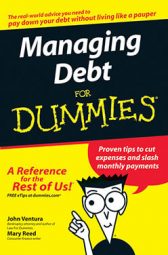If your credit history is poor, you can rebuild it over time so that when you apply for credit, creditors who evaluate your application see an improved credit history and a higher credit score.
Before you begin the credit rebuilding process, you need to get some preliminaries out of the way. These steps help you ensure that the credit-rebuilding process goes smoothly.
Order a copy of your credit history from each of the three national credit-reporting agencies. Review each record for errors, and correct any inaccuracies you find. Watch out for
Accounts that don’t belong to you.
Incorrect information about your accounts. For example, your credit report wrongly indicates that you defaulted on a loan or that you paid your MasterCard late.
Information about some of your accounts is incomplete. For example, your credit report does not show that you paid off a loan, got a federal tax lien released, or completed your Chapter 13 bankruptcy.
Negative account information that is too old to be reported still shows up.
Some of your identifying information (like your Social Security number, name, or address) is wrong. These kinds of errors can cause your credit information to be confused with someone else’s. As a result, that other person’s information could end up in your report.
After you correct an error in your credit history, order another copy of that record a month or two later to make sure the erroneous information has not returned. Sometimes, credit reporting agencies mistakenly reinsert erroneous information after that information has been corrected.
Find out your FICO score. This is the credit score most creditors use to get a quick measure of how your credit compares to other debtors. It’s derived from your credit record information. Generally, the higher your credit score, the more attractive you are to creditors; the lower your score, the harder it is to get credit, and the more the credit you get will cost you. A score between 650 and 700 is good; a score above 700 is stellar. Go to myFICO to get your score.
Start saving. It may be impossible to rebuild without having money in savings. For credit rebuilding purposes, you should have at least $1,000 in a savings account. However, don’t stop there. You also need money in savings so you can pay for unexpected expenses with cash rather than with a credit card. Ideally, you should have at least six months worth of living expenses in savings.

